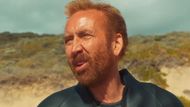When The Surfer begins, it feels like we’re just catching a laid-back swell with Nicolas Cage. Middle-aged, barefoot, sunburned, he returns to his hometown with his son and a dream: to buy back his childhood home and maybe reconnect over some nostalgic waves. But instead of a sentimental father-son bonding arc, he walks straight into a psychological gauntlet run by the Bay Boys, a feral crew of alpha surfers who guard the beach like it's holy land. Led by the hypnotically hostile Scally, they strip him of everything: car, phone, pride, even his flip-flops.
What unfolds isn’t just humiliation — it’s total ego annihilation. The line between surfer and survivor blurs. And in this weird, sun-bleached purgatory, masculinity rots under the weight of legacy, tribe, and fatherhood.
So when he finally catches that wave with his son, it’s not just a ride, it’s a resurrection. Or maybe surrender. We’re here to unpack that ending: the violence, the symbolism, and the the intense suffering inflicted on our surfer for simply wanting to surf.
What is The Surfer about?

The Surfer is a sun-soaked psychological fever dream disguised as a beachside drama. Directed by Lorcan Finnegan and starring the gloriously unhinged Nicolas Cage, the film takes place on the glistening coast of Western Australia, where surfboards double as status symbols and locals don’t take kindly to strangers dropping in. The gang is actually based on the real-life Lunada Bay Boys, a group who are infamous for their hostile localism.
Cage plays a nameless man who returns to his childhood beach with his teenage son, only to find paradise has been claimed by a pack of territorial surfer bros known as the Bay Boys and a leader called Scally. They’ve got one rule: if you don’t live here, you don’t surf here. And Cage? He just wants to ride a wave and relive the past. However, Scally actually does recognize the Surfer and remembers him leaving the town after his father's death. The ordeal he makes him go through simply stems out of amusement, or rather just a difficult test so he earns the right to surf there.

What starts as a passive-aggressive glare turns into an existential smackdown. The beach becomes a battlefield, and our surfer gets stripped of not just his board, but his ego, his identity, and maybe even his mind. We watch him unravel in real time, drinking puddle water, bonding with dead animals, and mumbling about wave etiquette like it’s scripture. He loses access to all his money as his phone dies and is forced to surrender his father's watch to the Bay Boys.
This isn’t just about surfing. It’s about masculinity in a meltdown, nostalgia as a weapon, and the terrifying line between standing your ground and losing your grip.
The Surfer also meets the Bum, a scruffy outcast who lives in a broken-down station wagon and spends his days spying on Scally’s gang through binoculars. Bitter and broken, he claims Scally killed his son and dog, becoming both a cautionary tale and a reluctant guide in the Surfer’s unraveling descent.
How does The Surfer end? Does he finally get to surf?

As the sun sets on the blistered shores of Western Australia, The Surfer builds to a feral, feverish finale. Nicolas Cage, playing the unnamed protagonist, is now a hollowed-out version of the man who once rolled into town with a surfboard and a dream. Stripped of his car, phone, surfboard, dignity, and even his father’s watch, he’s a broken man baking in coastal madness.
One final showdown unfolds, orchestrated by the mysterious Bum. He returns with a weapon and a past soaked in loss. He claims that Scally murdered his son and his dog. Fueled by rage and grief, the Bum escalates a turf war into something much darker. With Cage’s character, his son, and Scally all gathered at the beach, the Bum pulls the trigger, killing Scally in a moment that feels both shocking and weirdly inevitable.

Then, just as the sand begins to settle, the Bum takes his own life. The beach, once pulsing with ego and testosterone, now lies quiet beneath a blanket of sorrow.
What follows is not a triumph. It’s something quieter, sadder, more profound. The Surfer and his son paddle out into the surf together. No more threats. No more violence. Just the open sea and the possibility of peace. The waves, once a battleground, have become a balm. In their silent ride across the water, there's release, not victory, but liberation.
The ending doesn’t tie things up in a neat bow. It leaves you floating in its surreal aftermath. Revenge has been served, sure, but the real win is the human connection. Masculinity has been stripped bare, imploded from within. Identity has been tested. And somewhere in all that chaos, healing begins.
What does the film's ending signify?

The ending of The Surfer isn’t about riding a wave, it’s about letting go and letting the tide carry you back to who you really are. After being broken down by the Bay Boys, Cage’s character isn’t just bruised, he’s cracked open. No car, no house, no ego. Just a man and the wreckage of the life he thought he deserved.
Cage doesn’t claim to be triumphant. He just paddles out with his son, not as a legend or a landowner, but as a man trying to make peace. The ocean becomes a form of salvation, and the Surfer has finally earned it.
The Surfer dives deep into toxic masculinity and machismo, exposing how these attitudes harm everyone involved. Scally, charming yet menacing, embodies this aggressive male ego, which destroys both the Bum and the Surfer’s spirits. The Surfer himself starts off believing wealth can fix everything, but his confidence shatters under relentless torment.
The ending signifies just one thing: redemption isn’t about reclaiming a kingdom, it’s about learning how to kneel. It’s a quiet, powerful reminder that survival isn’t about fighting the tide, but learning to flow with it.
Love movies? Try our Box Office Game and Movie Grid Game to test your film knowledge and have some fun!
